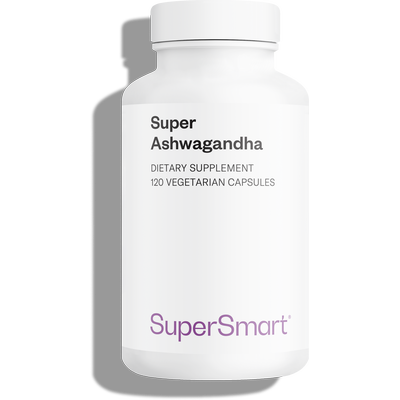Can ashwagandha improve your sleep?

Ashwagandha, also known as Withania Somnifera or ‘Indian ginseng’, is one of a select group of ‘superfoods’ that also includes acai, goji berries, spirulina … And, like ginseng and rhodiola, it is also belongs to the group of “adaptogens”, plants that can help the body adapt to all kinds of stress: fatigue, anxiety, inflammation, insomnia …
A plant with innumerable benefits
The roots and leaves of ashwagandha are used in the millennia-old system of Indian medicine called Ayurveda. The plant is exceptionally rich in active compounds: alkaloids, steroidal lactones, sitoindosides and withalonides … compounds that give ashwagandha a wide range of properties. It’s used in the treatment and relief of many health issues (1), with roles that include, but are not restricted to, the following:
- stimulating the immune system, fighting chronic fatigue;
- combatting stress, chronic anxiety, depression;
- stimulating libido and fertility;
- presenting anti-tumour properties, particularly promising in the fight against cancer;
- helping to protect against the development of Alzheimer’s and Parkinson’s disease;
- helping to slow down cellular ageing through an antioxidant effect;
- protecting the cardiovascular system;
- combatting insomnia.
And it is actually this last area which we’re focusing on here as insomnia has become a major public health issue.
Does ashwagandha have proven effects on sleep?
Pharmacological treatments for insomnia often encourage habituation or even dependency. The soporific effect of ashwagandha poses no such risk and thus offers significant hope to insomniacs.
Withania Somnifera, as its name suggests, has genuine soporific qualities, which have long been thought to originate from its roots. Yet scientists (2) have shown that the plant’s leaves contain triethylene glycol (TEG) and that it is this component which is actually responsible for its soporific effects. The effects of TEG alone have indeed been shown to have a sleep-inducing effect in mice, though human trials are needed before this compound can be considered as a potential treatment for insomnia.
Ashwagandha supplements thus offer an excellent way of benefiting from the properties of this plant!
What’s the ideal dose if you want to gain maximum benefit from ashwagandha?
Ashwagandha is available mainly in powder or capsule form. It’s best to choose a supplement that displays the total amount of withalonides it contains: products made from the whole plant extract should contain at least 1.5% withalonides.
In terms of the daily dose, a minimum of 6g of withanolides in total is recommended in order to produce real effects. Attention: ashwagandha is not recommended for women who are pregnant or breastfeeding or for young children.
Ashwagandha has a genuine effect not only on insomnia but on many other health problems: its adaptogen qualities make it a valuable ally for everyday life.
Written : Avril 2019
References
- M. Umadevi, R. Rajeswari, C. Sharmila Rahale, S. Selvavenkadesh, R. Pushpa, K.P. Sampath Kumar, D. Bhowmik. Traditional And Medicinal Uses of Withania Somnifera. The pharma innovation. Vol. 1, n°9, pp 102-110, 2012.
- Triethylene glycol, an active component of Ashwagandha (Withania somnifera) leaves, is responsible for sleep induction. Mahesh K. Kaushik , Sunil C. Kaul, Renu Wadhwa, Masashi Yanagisawa, Yoshihiro Urade. PLOS ONE Public Library of Science, 2012.

An organic Withania somnifera extract for mental health and relaxation
www.supersmart.comAll rights reserved
Free
Thank you for visiting our site. Before you go
REGISTER WITHClub SuperSmart
of exclusive benefits:
- Free: our weekly science-based newsletter "Nutranews"
- Special offers for club members only

















